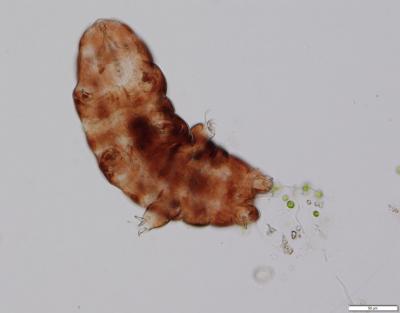
Credit: Ricardo Neves
Global warming, a major aspect of climate change, is already causing a wide range of negative impacts on many habitats of our planet. It is thus of the utmost importance to understand how rising temperatures may affect animal health and welfare. A research group from Department of Biology, University of Copenhagen has just shown that tardigrades are very vulnerable to long-term high temperature exposures. Animals, which in their desiccated state are best known for their extraordinary tolerance to extreme environments.
In a study published recently in Scientific Reports (an open access journal published by Nature Publishing Group), Ricardo Neves and Nadja Møbjerg and colleagues at Department of Biology, University of Copenhagen present results on the tolerance to high temperatures of a tardigrade species.
Tardigrades, commonly known as water bears or moss piglets, are microscopic invertebrates distributed worldwide in marine, freshwater and terrestrial microhabitats.
Ricardo Neves, Nadja Møbjerg and colleagues investigated the tolerance to high temperatures of Ramazzottius varieornatus, a tardigrade frequently found in transient freshwater habitats.
– “The specimens used in this study were obtained from roof gutters of a house located in Nivå, Denmark. We evaluated the effect of exposures to high temperature in active and desiccated tardigrades, and we also investigated the effect of a brief acclimation period on active animals”, explains postdoc Ricardo Neves.
Rather surprisingly the researchers estimated that for non-acclimated active tardigrades the median lethal temperature is 37.1°C, though a short acclimation periods leads to a small but significant increase of the median lethal temperature to 37.6°C. Interestingly, this temperature is not far from the currently measured maximum temperature in Denmark, i.e. 36.4°C. As for the desiccated specimens, the authors observed that the estimated 50% mortality temperature is 82.7°C following 1 hour exposures, though a significant decrease to 63.1°C following 24 hour exposures was registered.
The research group used logistic models to estimate the median lethal temperature (at which 50% mortality is achieved) both for active and desiccated tardigrades.
Approximately 1300 tardigrade species have been described so far. The body of these minute animals is barrel-shaped (or dorsoventrally compressed) and divided into a head and a trunk with four pairs of legs. Their body length varies between 50 micrometers and 1.2 millimeters. Apart from their impressive ability to tolerate extreme environments, tardigrades are also very interesting because of their close evolutionary relationship with arthropods (e.g., insects, crustaceans, spiders).
As aquatic animals, tardigrades need to be surrounded in a film of water to be in their active state (i.e., feeding and reproducing). However, these critters are able to endure periods of desiccation (anhydrobiosis) by entering cryptobiosis, i.e., a reversible ametabolic state common especially among limno-terrestrial species. Succinctly, tardigrades enter the so-called “tun” state by contracting their anterior-posterior body axis, retracting their legs and rearranging the internal organs. This provides them with the capacity to tolerate severe environmental conditions including oxygen depletion (anoxybiosis), high toxicant concentrations (chemobiosis), high solute concentration (osmobiosis) and extremely low temperatures (cryobiosis).
The extraordinary tolerance of tardigrades to extreme environments includes also high temperature endurance. Some tardigrade species were reported to tolerate temperatures as high as 151°C. However, the exposure time was only of 30 minutes. Other studies on thermotolerance of desiccated (anhydrobiotic) tardigrades revealed that exposures higher than 80°C for 1 hour resulted in high mortality, with almost all specimens dying at temperatures above 103°C. It remained, yet, unknown how anhydrobiotic tardigrades handle exposures to high temperatures for long periods, i.e., exceeding 1 hour.
– “From this study, we can conclude that active tardigrades are vulnerable to high temperatures, though it seems that these critters would be able to acclimatize to increasing temperatures in their natural habitat. Desiccated tardigrades are much more resilient and can endure temperatures much higher than those endured by active tardigrades. However, exposure-time is clearly a limiting factor that constrains their tolerance to high temperatures.”, says Ricardo Neves.
Indeed, although tardigrades are able to tolerate a diverse set of severe environmental conditions, their endurance to high temperatures is noticeably limited and this might actually be the Achilles heel of these otherwise super-resistant animals.
###
Media Contact
Ricardo Neves
[email protected]
45-31-33-24-81
Original Source
https:/
Related Journal Article
http://dx.




